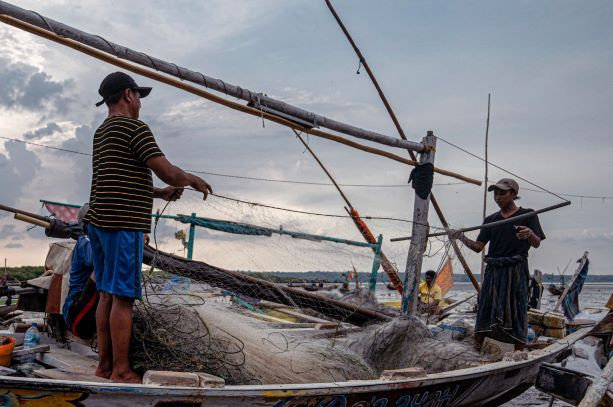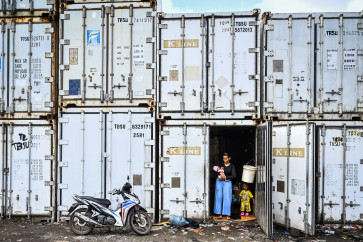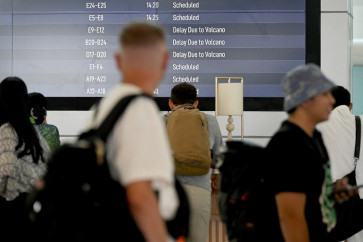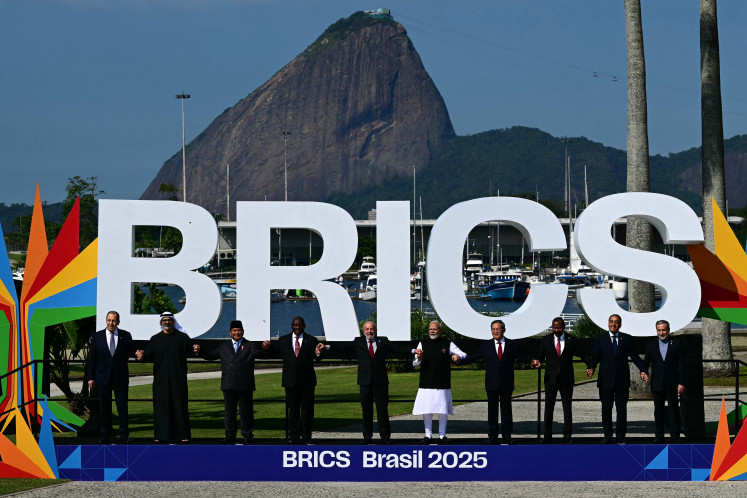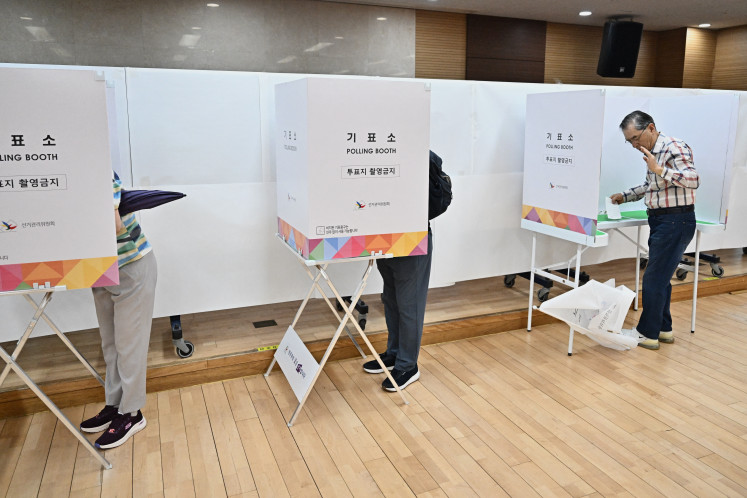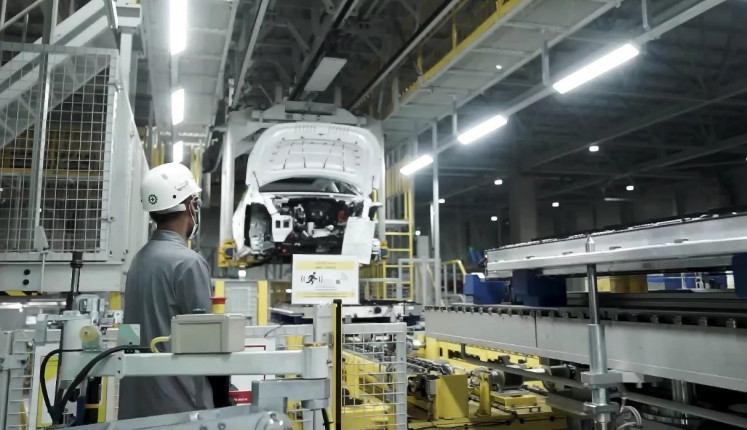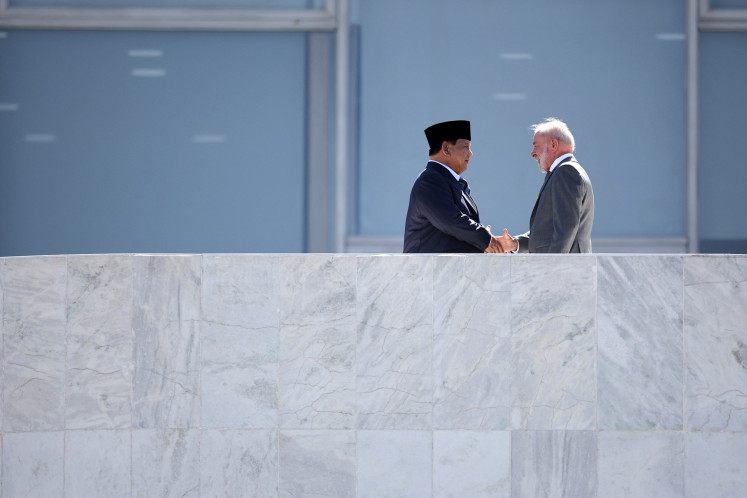Popular Reads
Top Results
Can't find what you're looking for?
View all search resultsPopular Reads
Top Results
Can't find what you're looking for?
View all search resultsThe blue economy under sustainability and justice principles
The Constitution has at least three articles that provide the basis for promoting blue justice and strong sustainability.
Change text size
Gift Premium Articles
to Anyone
“We owe it to ourselves and to the next generation to conserve the environment so that we can bequeath our children a sustainable world that benefits all,” says Wangari Maathai, the 2004 Nobel Peace Prize winner.
From the Arctic to Antarctica, the Earth is covered by oceans that sustain all kinds of living creatures on the planet. They play a substantial role in the world’s economy, ranging from fisheries and aquaculture, energy industries and tourism to international shipping. As significant as these roles are, the potential of the world’s ocean-based economy is estimated to be worth at least US$24 trillion.
In the context of Indonesia, the largest archipelagic state and the sixth-largest exclusive economic zone in the world, its ocean economy contributes considerably to the national income. Indonesia has the second-longest coastline in the world, and provides sea lanes for one of the busiest and most important shipping routes in the world, the Malacca Strait.
In terms of carbon-absorption potential, Indonesia is home to rich blue carbon ecosystems, with 3.3 million hectares of mangrove forests and 1.8 million ha of seagrass meadows.
Sadly, our oceans are in trouble. The impacts of marine pollution, climate change (e.g. sea-level rise, coastal storm surges, ocean warming and acidification), and overfishing have led to the extinction of some of the most crucial habitats and threaten roughly 775 million people across the region, who are highly dependent on marine ecosystems.
Consequently, ocean biodiversity, including fish stocks, is declining and the distribution of species in the ocean is changing. In Indonesia, illegal, unreported and unregulated (IUU) fishing, especially by foreign vessels, remains rampant, fisheries management has yet to optimally encourage sustainable fishing conduct and the acceleration of development along the coastline has hurt mangrove and seagrass ecosystems.
All the detrimental occurrences at sea have significantly affected ocean-dependent communities, including small-scale fishers, salt farmers and fisheries workers. Being at the forefront of coastal communities, small-scale fishers have too long faced adversity because of the rapid growth of modern industry.
The blue economy concept was introduced by Gunter Pauli in 2010 as a new economic model designed to address the issues of sustainability that go beyond mere preservation. The initial concept was familiarized during the “Rio +20” in 2012, with the blue economy conceptualizing oceans as “Development Spaces” where spatial planning integrates conservation, sustainable use, oil and mineral wealth extraction, bio-prospecting, sustainable energy production and marine transportation.
In that regard, the blue economy has been associated with blue growth, which turns out to have encouraged more exploitation of marine resources. This deviated concept has caused a wide range of injustices.
Chris Armstrong states in his book A Blue New Deal that principles for ocean justice include democratic inclusion and sustainability and precautionary principles. The literature reviewed by NJ Bennett in 2021 discovered 10 types of injustices as a result of blue growth/blue economy.
These injustices can be grouped into three main categories. First, injustices attributed to access to tenure, environmental rights and access to utilization of marine resources. Second, injustices in reference to the access to distribution of benefits, especially to marginalized groups, including women and indigenous people. Third, injustices concerning access to genuine community participation, frequently manifested in the lack of community involvement throughout the strategic decision-making process and governance.
In response to these sustainability crises and the blue injustices, international leaders of large ocean nations, experts, academics and researchers have been developing a new ocean paradigm, among which are the Sustainable Ocean Economy principles of the High-Level Panel for a Sustainable Ocean Economy, Blue Justice and the Blue New Deal principles.
There has been a perception that the current sustainable development paradigm does not necessarily safeguard blue economy activities, which affect environmental degradation and social injustices. So, whenever we talk about sustainable development, what kind of sustainability are we referring to?
There are two kinds of sustainability: Weak and strong. Strong sustainability does not view the environment merely as economic potential but also for its sustainable value for ecosystem functions and people's well-being. Thus, critical natural capital cannot be substituted by man-made assets. Meanwhile, weak sustainability is based on a human-centric market economic theory, in which critical natural capital can always be replaced by man-made wealth.
For the sake of the planet’s environmental sustainability and long-term benefits for the next generations, the answer is quite straightforward. We need blue justice and a strong sustainability kind of development.
A strong sustainability concept in ocean policy is crucial for preserving marine ecosystems, mitigating climate change, managing fisheries sustainably, preventing pollution and ensuring intra-generational and intergenerational equity. Strong sustainability requires strong instruments of protection incorporated at the constitutional and statutory levels.
Existing ocean-related laws and policies in Indonesia offer early indications of the significance of safeguarding these resources. The Constitution has at least three articles that provide the basis for promoting blue justice and strong sustainability: Article 28H, which stipulates the right to the environment; Article 33 paragraph 3, which says that natural resources shall be used for the greatest benefit of the people (the social justice aspect); and Article 33 paragraph 4 as the basis for the implementation of ecologically and equitably sustainable development.
The prevailing laws and regulations and the Indonesian ocean policy spearheaded by the Office of the Coordinating Maritime Affairs and Investment Minister and the Indonesia blue economy road map produced by the National Development Planning Ministry, should duly incorporate principles of blue justice and strong sustainability in their implementation at national, provincial and community levels.
The transformation toward sustainable and equitable ocean governance will not happen overnight, but will undeniably transpire within the span of long-term commitment and consistency in implementing the principles in national development.
***
Mas Achmad Santosa, Grace Gabriella Binowo and Harish Makarim are, respectively, the CEO, program director and researcher at the Indonesia Ocean Justice Initiative.

